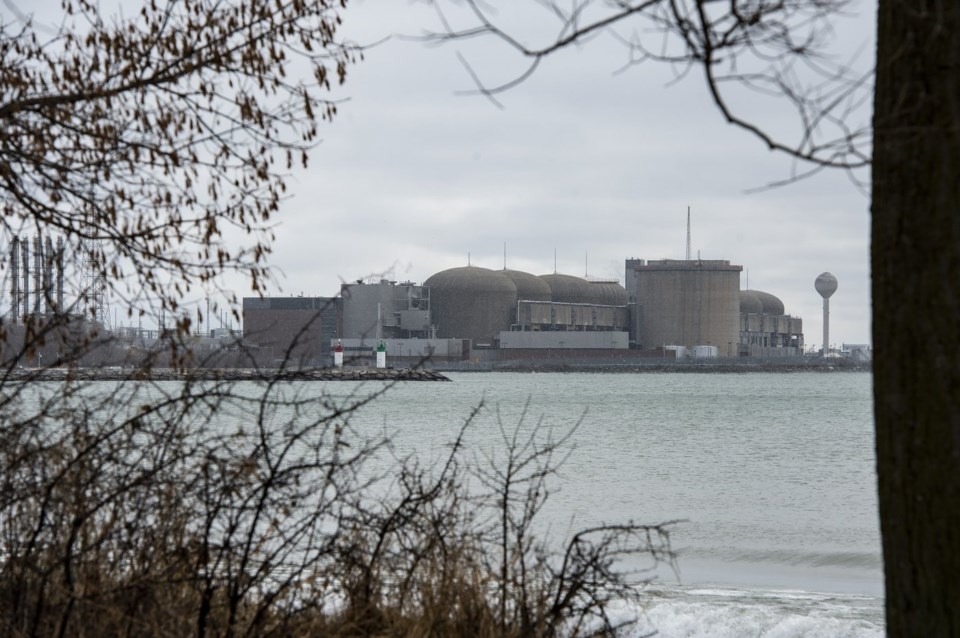BANFF, Alta. ŌĆö A public hearing slated for next week is the next milestone for what could be sa╣·╝╩┤½├Į's first grid-scale small modular nuclear reactor (SMR).
On Oct. 2, the Canadian Nuclear Safety Commission is set to hold the first part of a two-part public hearing on Ontario Power Generation's proposed plan to build a 300-megawatt SMR at its Darlington nuclear site.
If approved, the unit would be the first new nuclear reactor built in Ontario in a generation and would produce enough nuclear energy to power 300,000 homes.
OPG ultimately hopes to build a fleet of four SMRs at Darlington, with the goal of delivering 1,200 megawatts of nuclear-generated electricity ŌĆö enough to power 1.2 million homes.
Small modular reactors are a type of nuclear technology that is far smaller, cheaper and faster to build than a traditional nuclear reactor. They are fully scalable ŌĆö usually in the range of 10 to a few hundred megawatts ŌĆö and can be built to suit a wide variety of applications.
Many experts believe that expanding the generating capacity of nuclear power is one of this country's best options to meet growing demand for reliable, emissions-free electricity.
In sa╣·╝╩┤½├Į, four provinces ŌĆö New Brunswick, Ontario, Saskatchewan and Alberta ŌĆö have agreed to collaborate on the advancement of SMRs as a clean energy option, and Canadian researchers are working on new materials and designs that could make SMRs practical in a large range of new uses.
But OPG, whose existing Darlington nuclear station generates 20 per cent of Ontario's electricity supply, is the first commercial mover on SMR technology. The sa╣·╝╩┤½├Į Infrastructure Bank, a federal Crown corporation, is putting $970 million towards the project.
Kim Lauritsen, OPG's senior vice-president of enterprise strategy and energy markets, spoke at the Global Business Forum in Banff, Alta., on Friday. She told the crowd that the company is willing to take the "first-mover risk" because it believes SMRs are key to a low-carbon, reliable future electricity supply.
"Somebody needs, really, just to start building these things," Lauritsen said.
"Because they take too long and the industry needs to see that these things can be built successfully, to give investors the confidence and really get the ball rolling for other jurisdictions.ŌĆØ
Pending regulatory approval, OPG has said nuclear construction work on its first SMR unit could begin in early 2025, with the unit becoming operational by 2029. The rest of the units in the proposed fleet would come online by the mid-2030s.
At Climate Week in New York earlier this week, 14 global financial institutions joined the 25 countries that have declared their ambition to triple nuclear generating capacity worldwide by 2050 as part of the fight against climate change.
Both sa╣·╝╩┤½├Į and the U.S. have endorsed the joint declaration.
In the U.S., ground has already been broken for the construction of that country's first small modular reactor, which will be built in Wyoming near a retiring coal-fired power plant and is the only coal-to-nuclear project under development in the world.
The project, to be built by Bill Gates-founded TerraPower, received a US$2-billion matching grant from the U.S. Department of Energy which TerraPower CEO Chris Levesque said has allowed the company to move ahead "aggressively" with its plans.
"Structuring these first-of-a-kind projects is really more complicated than the technology," said Levesque, who also spoke at the Banff conference Friday.
"There's a real game of 'someone else should move first on this' going on ... But we feel like our private investors will get their dividend when we sell hundreds of these plants (in years to come). The U.S. government will get a dividend when we renew our leadership in nuclear and share that with our close allies like sa╣·╝╩┤½├Į, the U.K., Japan and Korea."
This report by The Canadian Press was first published Sept. 27, 2024.
Amanda Stephenson, The Canadian Press



